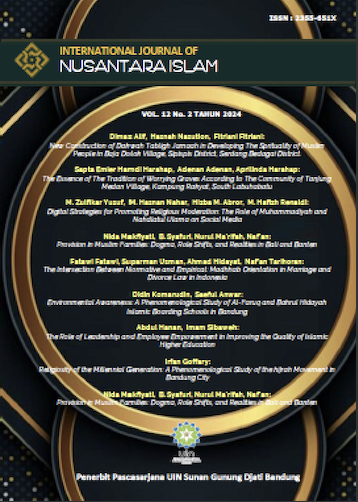Optimizing Knowledge Management Practices for Intellectual Capital Development at Universitas Islam Nusantara
Main Article Content
Abstract
This study aims to evaluate knowledge management practices in an Islam-based higher education environment, focusing on the utilisation of intellectual capital at Universitas Islam Nusantara Bandung. In the context of the digital era and global competition, higher education institutions’ ability to manage knowledge effectively is a key factor in improving academic quality and institutional competitiveness. This research uses a qualitative approach with a case study method, and data collection techniques through in-depth interviews, participatory observation, and institutional documentation. The results showed that knowledge management practices at Uninus covered the processes of knowledge identification, creation, dissemination, and implementation, although the implementation is still partial and conventional. The strategies implemented include the documentation of explicit knowledge and the capacity building of human resources in managing tacit knowledge. The conversion of tacit knowledge into explicit form is done through scientific forums and expertise-based assignments, but is not yet fully structured. Evaluation of the supporting tools indicates that some elements, such as document management, digital portals, expertise taxonomy, and ICT infrastructure, are available but not yet optimally integrated. These findings suggest that the effectiveness of knowledge management is highly dependent on the synergy between institutional strategy, technological readiness and organizational culture. Thus, this study suggests the importance of a holistic approach and strengthening institutional policies to maximise the potential of knowledge management in developing intellectual capital in Islamic higher education.
Article Details
The Authors submitting a manuscript do so on the understanding that if accepted for publication, copyright of the article shall be assigned to International Journal of Nusantara Islam, Sunan Gunung Djati State Islamic University.
The copyright encompasses exclusive rights to reproduce and disseminate articles in all forms and media, including reprints, photographs, microfilm, and similar reproductions, as well as translations. Some or all of the contents of this journal can be stored in databases and transmitted in any form and media without the need for written permission from the International Journal of Nusantara Islam, Sunan Gunung Djati State Islamic University.
The Editors and the Advisory International Editorial Board make every effort to ensure that no wrong or misleading data, opinions or statements be published in the journal. In any way, the contents of the articles and advertisements published in the International Journal of Nusantara Islam (IJNI) are sole and exclusive responsibility of their respective authors and advertisers.
References
Al-Tit, A. A., Al-Ayed, S. I., Alhammadi, A., Hunitie, M., Al-Sarayreh, A., & Albassam, W. (2022). The Impact of Employee Development Practices on Human Capital and Social Capital: The Mediating Contribution of Knowledge Management. Journal of Open Innovation Technology Market and Complexity, 8(4), 218. https://doi.org/10.3390/joitmc8040218
Anand, A. & Singh, M. D. (2011). Underlying Knowledge Management: A Literature Review. International Journal of Engineering Science and Technology (IJEST), 3(2), 922–934.
Anwar, S., & Umam, H. (2020). Transformative Education: Emphasizing 21st Century Skills and Competencies in the Independent Learning Curriculum. AIM: Journal of Islamic Education Management, 1(1), 1–16. https://doi.org/10.15575/aim.v1i1.28886

